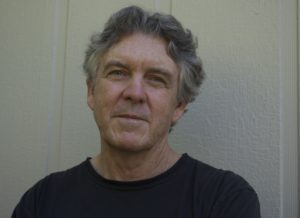Fisherman
“I’m an amateur,” he said. “I write, rewrite, then night comes ’round, I stand, turn on the light, switch on the heat, head to the kitchen, cook, sit down & eat. That’s what I do with my day. Not that glamorous!”
He said that to me once, but he’s no amateur. In the waters of our language he owns his own sea: poised
there at the edge of his separate shore he casts, tracks the leader, waits—quick shock through the tips of his fingers, reels in: the ratcheting click, rise of scales & iridescent skin, sound after sound bound into his work, & now a new note finds its way in.
Outside Las Cruces
My friend Peter used to tell me about how he’d sit on his front porch in New Mexico, dark days, dry days, watch lightning strike the distant chaparral—flare of burning tumbleweeds, the scrub ablaze. Sometimes it was silent, he said, summer thunder too far to hear or wind blowing its sound the other way, & in the distance he’d see a blade of light tear the sky/strike a patch of greasewood, flare of burning oil rising/subsiding, then the storm would move downplain, strike creosote this time, shock it, too, aflame. I liked it best that way— silent, & I could follow it. I didn’t know where it was going, but my eyes knew.
Brocade Dress
On the way back from the dance in the days of cars with bench seats, she slid over to you, put her hand on your thigh, said Shall we pull over & park? & she was dark & beautiful & now these many years later you see she was desperate for you & you for her & what did you say, Catholic boy? Oh, I’d better get home & the fact was you could have said I’d love to but I wouldn’t know what to do—and now you know that that would have been OK, that she would have said I’ll teach you, then—she was kind that way— for she’d been taught & perhaps had taught others & for her this was not new, and what a lesson it would have been.
Twenty years later you’re alone on an elevator in a department store, you’re going down & the door opens at a floor before the one you want & you see in the distance a gold brocade dress draped across an ornate chair & from hard right she steps into the elevator & you look at each other & you hear her quick intake of breath as she must have heard yours & she turns to face the door & at the ground floor the door opens & each of you walks away.
The tunnel foreman,
soon to retire—he’d been at it forty years—fell forward onto the breakfast
table, massive heart attack, when before work one Friday he opened his copy
of The Seattle Times: FORECAST SEES NO LIGHT AT END OF TUNNEL FOR SIX
YEARS. The headline, meant to yield wry smiles, written by an intern twenty-
two years old.
All his life the man had been building arteries in the dark, slicing veins
of stone.
“You have no idea what he’d gone through,” said his wife, in a
subsequent interview with The Times.
Unpublished poems, courtesy of the author.

Gerald Fleming’s newest book is One (Hanging Loose Press, New York, 2016), prose poems in monosyllabics. Previous books are The Choreographer (prose poems, Sixteen Rivers Press, California, 2013), Night of Pure Breathing (prose poems, Hanging Loose, 2011), and Swimmer Climbing onto Shore, poetry (Sixteen Rivers, 2005). He taught in San Francisco’s public schools for thirty-seven years and has written three books for teachers, including Rain, Steam, and Speed (Jossey-Bass/Wiley). From 1995 to 2000, he edited and published the literary magazine Barnabe Mountain Review, and is currently editing both the limited-edition vitreous magazine One (More) Glass and The Collected Prose & Poetry of Lawrence Fixel. He lives most of the year in Lagunitas, California, and part of the year in Paris.





















































